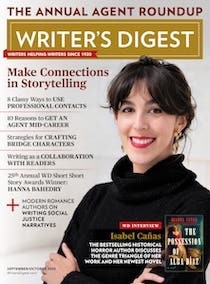Concerning Literary Agents and Self-Publishing: Part 2
This past weekend at a writers’ conference, I heard a lot of good information from fellow presenters regarding why many books are self-published, as well as the realities about how self-published books that tell a writer’s personal story almost never get picked up by big houses.
This past weekend at a writers' conference, I heard a lot of good information from fellow presenters regarding why many books are self-published, as well as the realities about how self-published books that tell a writer's personal story almost never get picked up by big houses.
Both writer Bob Mayer and literary agent Chip MacGregor said that writers' first books are often about their personal stories. Many people draw upon unusual or "rough" aspects of their life: their father was a traveling inventor, they have a loveless marriage, they were abused as children, they dealt with a parent who was addicted to drugs, they went to 16 different schools as a child because their mother was paranoid of alien abductors, etc. These writers then take their personal stories and make them into books—either nonfiction accounts of their life, or as novels, with the characters based on real people.
The problem with these stories is: There are way too many of them. It's not to say that your story doesn't matter and isn't tremendous, it's just that there are too many personal stories out there for yours to stand out. I know that, to you the writer, it's demoralizing to think that your life story is one of countless others flooding the self-published book pool. Writers believe their story will be of interest to many; that's why they self-publish. The feeling is, as Jack said in Sideways: "Publish it yourself. Just get it out there; get it reviewed. Let the public decide." But the reality is that almost no publications review self-published books. There are just too many. Following the book's printing, writers may try to get an agent to take on representing the book and selling it to a large publisher. This is a difficult task.
First of all, remember that many, many people self-publish their personal stories—so the world is full of such books. Also, it makes little difference to an agent whether your story is told through so-so writing versus those that are told through good writing. The reason: "Personal story is dead," says MacGregor.
According to MacGregor, the best (only?) way to deal with a powerful personal story book is through BOR sales—"back of the room" sales. If you have the opportunity to speak to various groups of people and give a presentation that relates to your personal story, you can sell your books at such events. "The fact is, it probably works better as a self-published book that's sold 'BOR' than it is at a regular royalty publisher, because without you there, the book won't sell," MacGregor says. "They are buying you and a piece of you, and consequently, those books are better self-published."
If you're writing a book about (or based on) your personal story, ask yourself: Who is the target audience? Friends and family? College students? Can you reach the target audience yourself? If you can, you're in business. If you can't, and your goal is to get it reviewed (and noticed!), then you're fighting a tough battle. Very, very few self-published books are picked up by agents because very, very few self-published books will sell well in the general market.
Agree? Disagree?
Chuck Sambuchino is a former editor with the Writer's Digest writing community and author of several books, including How to Survive a Garden Gnome Attack and Create Your Writer Platform.



